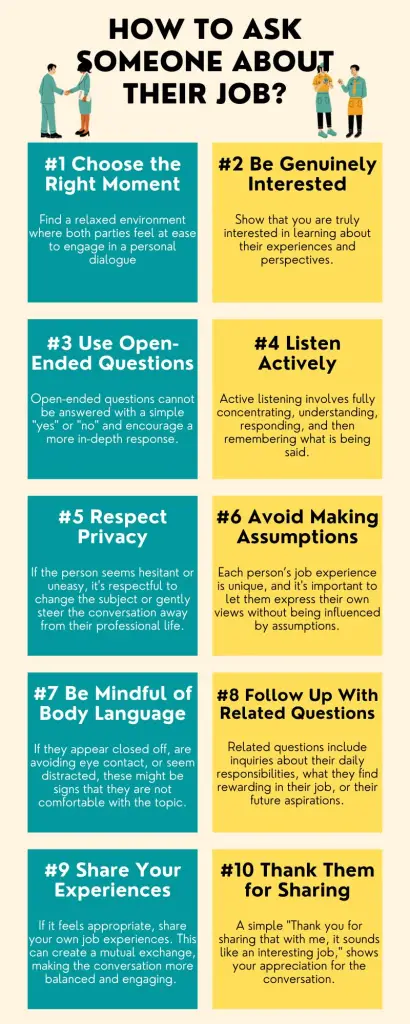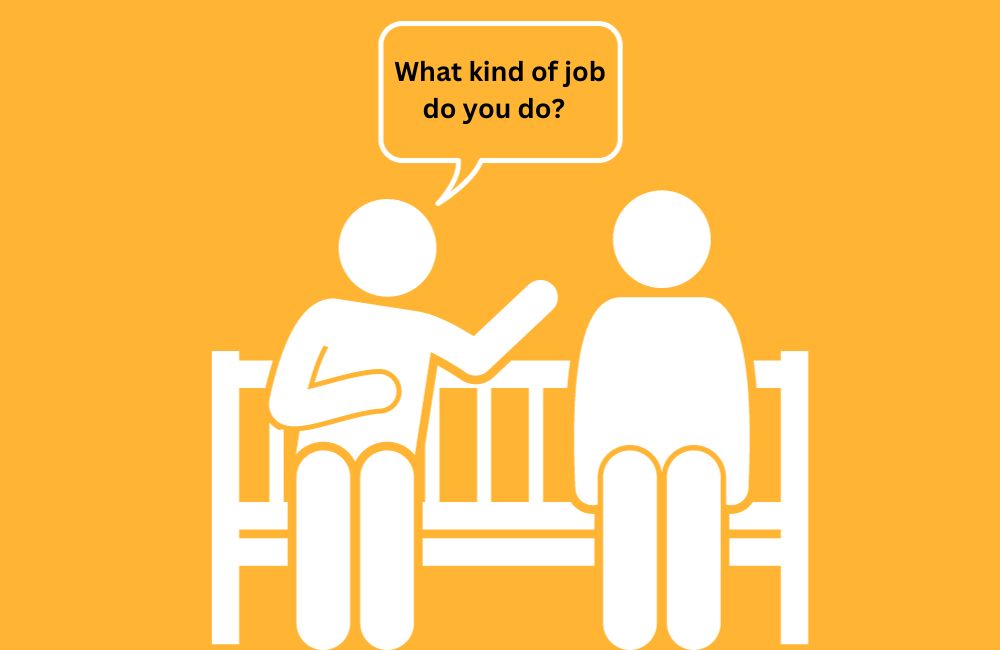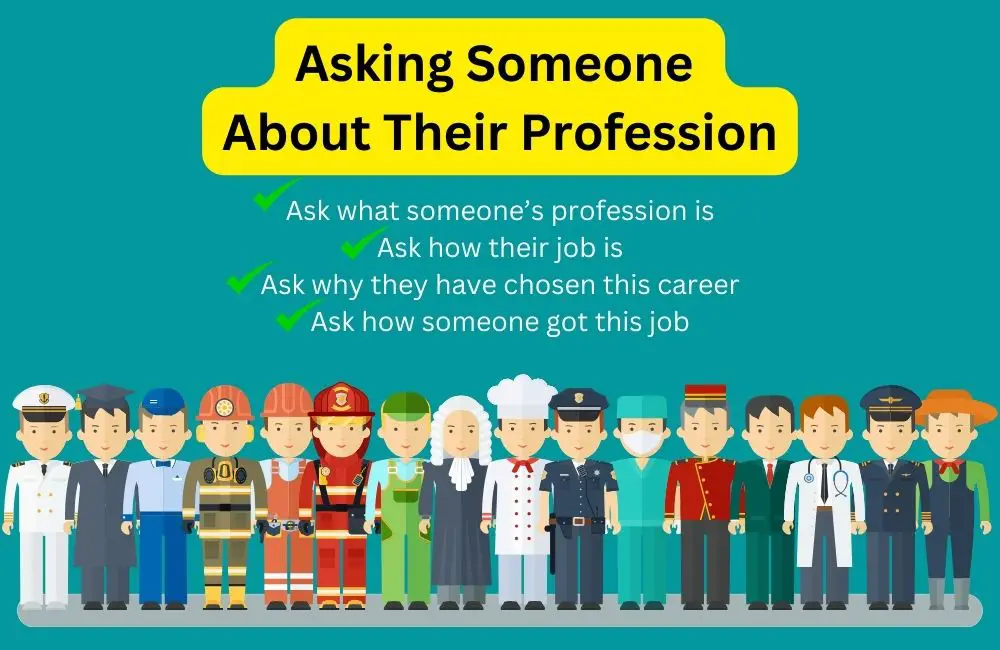This article covers the following areas –
- 10 Tips to Ask Someone About Their Job
- Asking What Someone’s Profession Is
- Asking How Someone’s Job Is
- Asking Why Someone Has Chosen This Career
- Asking How Someone Got This Job
- Final Note
- FAQ: Asking Someone About Their Profession in English
We frequently meet new people either in a social or professional setting, and we need to get to know each other to build a good network. While talking to someone you just met or you already know, one of the most common topics you can discuss is their professional life. If you wonder how to ask someone about their job or work in English, this post is for you. I’ll share some Polite English expressions and tips to ask someone what job they do and how their jobs are.
“What line of work are you in?” and “What do you do for a living?” are the two common questions you can ask someone to know about their job. You can also ask, “What excites you most about your job?” and “What is the culture like at your office?” to know about their job nature and work environment.
Do you know some other smart and polite ways of asking someone about their profession? Let us know in the comment box. If you want to improve your communication skills further, you may check 4 Essential Keys to Effective Communication in Love, Life, Work–Anywhere! (Amazon Link). This book is an excellent ‘How-To Guide’ to help you identify and overcome communication barriers and achieve relationship success with the important personal and professional people in your life.
10 Tips to Ask Someone About Their Job
Discussing someone’s job can be a great conversation starter, but it’s important to approach the topic with tact and respect. Here are some tips for asking someone about their job in a way that is both engaging and considerate:

#1 Choose the Right Moment
Selecting an appropriate time and setting is crucial when initiating a conversation about someone’s job. It’s advisable to avoid delving into personal topics like employment during moments of stress or when someone is clearly occupied. Instead, find a relaxed environment where both parties feel comfortable engaging in a personal dialogue. This could be during a coffee break, at a social gathering, or in a casual office environment.
#2 Be Genuinely Interested
Your genuine interest in their job will encourage a more open and detailed response. Show that you care about what they have to say, not just out of politeness but because you are truly interested in learning about their experiences and perspectives. This authenticity is often reflected in your tone of voice, facial expressions, and the follow-up questions you ask.
#3 Use Open-Ended Questions
Open-ended questions cannot be answered with a simple “yes” or “no” and encourage a more in-depth response. For example, asking, “What challenges do you face in your work?” or “How did you get interested in this field?” invites the person to share more about their experiences and thoughts, providing a richer understanding of their job.
#4 Listen Actively
Active listening involves fully concentrating, understanding, responding, and then remembering what is being said. This means nodding in agreement, maintaining eye contact, and interjecting with relevant questions or comments. Active listening shows that you value their opinions and are engaged in the conversation.
#5 Respect Privacy
It’s important to remember that not everyone may feel comfortable discussing their job, especially if they are experiencing stress or challenges. If the person seems hesitant or uneasy, changing the subject or gently steering the conversation away from their professional life is respectful. Respecting their privacy builds trust and shows that you consider their feelings.
#6 Avoid Making Assumptions
Avoid jumping to conclusions about their job satisfaction or career choices based on their profession or your own biases. Each person’s job experience is unique, and it’s important to let them express their own views without being influenced by assumptions.
#7 Be Mindful of Body Language
Body language can provide significant cues about how comfortable someone is with the conversation. If they appear closed off, avoid eye contact, or seem distracted, these might be signs that they are uncomfortable with the topic. In such cases, it’s wise to steer the conversation towards a more neutral subject.
#8 Follow Up With Related Questions
If the person appears willing to discuss their job, demonstrate your interest by asking related questions. This might include inquiries about their daily responsibilities, what they find rewarding in their job, or their future aspirations. This not only shows that you’re listening but also that you are genuinely interested in their career journey.
#9 Share Your Experiences
If it feels appropriate, share your own job experiences. This can create a mutual exchange, making the conversation more balanced and engaging. Sharing your experiences can establish common ground and lead to a more in-depth and meaningful conversation.
#10 Thank Them for Sharing
Always express your gratitude to the person for sharing information about their job. A simple “Thank you for sharing that with me; it sounds like an interesting job” acknowledges their willingness to share personal details and shows your appreciation for the conversation.
Remember, the key is to be respectful, show genuine interest, and create a comfortable space for the other person to share their experiences.
Well! If you are looking for a book or a guide to help you learn and improve your English, you may try English Made Easy Volume One: A New ESL Approach: Learning English Through Pictures (Amazon Link). This book creatively uses pictures and text in tandem to revolutionize English language learning, making it easier to understand and more effective overall.
Asking What Someone’s Profession Is

The best practice for asking someone about their job is using open-ended questions. Open-ended questions are WH questions that allow someone to talk about something in detail, providing some specific information. Some people are not at all comfortable talking about professional life. So make sure you create a condition to ask them about their occupation.
To inquire about someone’s profession, it’s polite to phrase the question considerately. You may ask, “May I know what your professional field is?” or “What do you do for a living?” These questions are respectful and invite the person to share details about their occupation.
Remember! Depending on the setting (formal/informal), your choice of words, tone, and body language may vary. When in a casual environment, you can pose some direct questions, but it may sound impolite to some people. Here, I present some expressions that you can use to ask someone about what job they do.
Formal Setting Expressions
In a formal setting, it’s important to use respectful and considerate expressions while asking about someone’s profession. These phrases are designed to be polite and professional, suitable for conversations in a workplace or formal social events:
- What do you do for a living?
- May I know what your professional field is?
- What has your career path been?
- What kind of job do you do?
- What line of profession are you in?
- What are your long-term career goals?
- What professional skills are you currently working on?
- What’s something you’re really into right now?
- What has been your biggest success factor?
- What are your next career steps?
- What professional associations are you a member of?
- How do you spend your regular day?
- I would be interested to hear about what you do.
- Can I ask what you do?
- May I ask where you currently work?
Informal Setting Expressions
When in a more casual or informal environment, using direct and straightforward expressions is appropriate. These are suitable for friendly gatherings or casual conversations where a relaxed tone is prevalent:
- What do you do?
- What are you?
- What line of profession are you in?
- What is your profession?
- What is your occupation?
- Where do you work?
These lists offer a variety of ways to ask about someone’s profession, tailored to fit the formality of the setting and ensure the inquiry is made in a respectful and appropriate manner.
Sample Conversation: Asking What Someone’s Profession Is
Formal Context: At an industry conference, Ms. Zara, a project manager, meets Mr. Hasan, a fellow attendee, during a coffee break.
Ms. Zara: Good afternoon, Mr. Hasan. May I inquire about your professional field?
Mr. Hasan: Good afternoon, Ms. Zara. I work in the field of data analytics.
Ms. Zara: That’s fascinating! What kind of projects do you handle?
Mr. Hasan: Mostly big data sets for marketing strategies.
Informal Context: At a neighborhood barbecue, Sara, a graphic designer, talks with her new neighbor, Jamal.
Sara: Hey Jamal, what do you do for a living?
Jamal: Hey Sara, I’m a school teacher teaching high school mathematics.
Sara: That’s awesome! I’m a graphic designer, mostly in digital media.
Jamal: Cool, we need creative minds like yours!
Asking How Someone’s Job Is

To ask someone about how their job is, it’s better to start by asking about what job they do. You should NOT ask any Yes-No questions or Tag questions. Instead, pose open-ended questions and give them enough space to decide what they would share and not.
To inquire about someone’s job experience, a respectful approach is key. You might ask, “How are you finding your current role?” or “Are you enjoying your work these days?” These questions are courteous and open-ended, giving a detailed response about their job satisfaction.
Be considerate about the setting and the relationship you have with the person. For example, if someone is your close friend, you can directly question their job life. However, you must be polite and never say anything that may offend or make them uncomfortable talking. The following sections show some expressions for asking about how someone’s job is.
Formal Setting Expressions
When inquiring about someone’s job in a formal setting, it’s essential to use respectful expressions and encourage detailed responses. These questions are suitable for professional environments or situations where a more measured approach is appropriate:
- How long have you worked in this industry?
- How do you manage your time for work?
- How does this company differ from others you’ve worked for?
- How do you make decisions at work?
- How has the industry changed since you started?
- How do you handle workplace disappointment?
- How does your position fit within the organization?
- What is your favorite part of your job?
- Which branch do you work for?
- What do you do at work daily?
- What’s the best thing about your job?
- How does your job affect your general lifestyle?
- What excites you about your job?
- What are the primary responsibilities of your position?
- What is the culture like at your company?
- What organizational challenges have you faced?
- What kinds of decisions do you make?
- What do you like most about your work?
- What is a typical day like for you at work?
- What skills and abilities are essential to success in your industry?
- What are some common career paths in this field?
- What personal attributes are essential to success in your field?
Informal Setting Expressions
It’s appropriate to use more direct and casual expressions in an informal setting. These are ideal for conversations with friends or in relaxed social settings:
- How’s your job going?
- Enjoying your work these days?
- What’s new at your job?
- How are you finding your work lately?
- Got any interesting projects at work?
- What do you like about your job right now?
- Any challenges at work you’re excited about?
- How’s the work-life balance going?
- What’s been keeping you busy at work?
- Seen any changes at your job recently?
These lists provide a variety of expressions to inquire about someone’s job, making sure the questions are suitable for the formality of the setting and respecting the nature of your relationship with the person.
Sample Conversations: Asking About Someone’s Job
Formal Context: At a professional networking event, Mr. Ahmed, a software engineer, talks with Ms. Rahman, an IT project manager.
Mr. Ahmed: Ms. Rahman, how long have you worked in the IT industry?
Ms. Rahman: I’ve been in this field for about 10 years now. It’s been quite a journey.
Mr. Ahmed: That’s impressive. What’s your favorite part of your current role?
Ms. Rahman: I enjoy leading diverse projects and the opportunities to innovate.
Mr. Ahmed: And how does your job fit within the overall organization?
Ms. Rahman: My role is pivotal in bridging technical and non-technical teams.
Informal Context: During a neighborhood potluck, Liam, an architect, chats with his friend Tara, a school teacher.
Liam: Hey Tara, how’s your job going these days?
Tara: It’s going well, Liam. We’ve got some exciting new teaching methods to try out.
Liam: That sounds great! Any particular challenges you’re excited about?
Tara: Yes, integrating technology more effectively in the classroom.
Liam: And how’s the work-life balance treating you?
Tara: It’s a bit challenging, but I’m finding my rhythm.
Asking Why Someone Has Chosen This Career

If you are a fresh graduate or wondering which career to pursue, you can talk to others about their professional life. As a result, you can get an idea about the industry, the present, and the future of the sector.
To understand why someone chose their career, phrase the question to encourage reflection. Ask, “What inspired you to pursue this career?” or “Could you share what motivated your career choice?” This approach is thoughtful and invites an insightful explanation of their decision.
If you have a casual relationship with the person, you can learn about their career in detail. However, consider how deep you can go if you have just met someone and want to discuss their job. Here are some expressions to ask someone about why they are into this job.
Formal Setting Expressions
When inquiring about someone’s career choice in a formal setting, it’s important to use respectful, encouraging expressions that foster a sense of professional curiosity. These questions are ideal for situations like networking events, professional meetings, or when interacting with colleagues in a more formal context:
- What brought you to this industry?
- What was your first job?
- How do you maintain a work-life balance?
- How did you become interested in this field?
- How did you begin your career?
- Where do you see the industry going in the future?
- Why do you do your job?
- What’s the best job decision you ever made?
Informal Setting Expressions
In an informal setting, you can use more relaxed and personal expressions. These are suitable for conversations with friends peers, or in more casual social interactions:
- What inspired you to choose this career?
- How’d you end up in your field?
- What’s your favorite thing about your job?
- What got you started in this career?
- Did you always want to work in this industry?
- What’s the coolest part of your job?
- Any funny stories about how you started your career?
- What’s the most unexpected part of your job?
These sets of expressions are tailored to suit the formality of the setting, ensuring that the questions are appropriate and respectful while also inviting meaningful discussions about career choices.
Sample Conversations: Asking Why Someone Chose Their Career
Formal Context: At a business conference, Mr. Iqbal, a young entrepreneur, meets Dr. Hassan, a seasoned research scientist.
Mr. Iqbal: Dr. Hassan, what brought you to the field of scientific research?
Dr. Hassan: I’ve always been fascinated by the unknown and the potential to discover new things. It was a natural choice for me.
Mr. Iqbal: That’s intriguing. How did you begin your career in this area?
Dr. Hassan: I started as a lab assistant during my undergraduate studies, and my passion grew from there.
Mr. Iqbal: And where do you see the industry heading in the future?
Dr. Hassan: There’s immense potential for breakthroughs in sustainable technologies.
Informal Context: At a casual dinner party, Sarah, a graphic designer, chats with Jake, her friend who’s a music teacher.
Sarah: Jake, what inspired you to choose a music career?
Jake: Ever since I was a kid, I found joy and expression in music. It just felt right to follow that path.
Sarah: That sounds wonderful. Did you always want to be a teacher?
Jake: Not initially, but I love sharing my passion for music with others, so it became a clear choice.
Sarah: What’s the coolest part of your job?
Jake: Seeing students discover their musical talents and grow in confidence. It’s incredibly rewarding.
Asking How Someone Got This Job

If you are an aspiring candidate looking for a job, you can ask someone for job opportunities. You can ask them if there is any opening in their company. You can also discuss the procedure and required skills to enter the same company.
Use a considerate approach to inquire about someone’s journey to their current job. Ask, “Can you share how you secured this position?” or “I’m curious about your path to this role. Could you tell me more?” These questions are respectful and encourage sharing their professional journey.
You can ask someone to know how they got the job in different ways. Here are some examples given below.
Formal Setting Expressions
In a formal setting, where the conversation is professional and possibly with someone you’re not acquainted with, it’s crucial to use respectful expressions that show genuine interest in their career path. These questions are suitable for professional environments, such as job fairs, networking events, or during formal meetings:
- What hard skills should someone in your field have?
- What skills did you develop early in your career?
- What soft skills should someone in your field have?
- What should I be doing to improve my career prospects?
- What skills have you found vital to your job?
- What is your greatest career strength?
- How did you get to this position?
- Which has been more valuable in your career, education, or experience?
Informal Setting Expressions
The expressions can be more personal and direct in an informal setting, where the conversation is more relaxed and might involve friends, family, or casual acquaintances. These questions are great for casual social gatherings, coffee meetings, or when chatting with friends:
- How did you land your current job?
- What was your journey like to get where you are now?
- What skills really helped you succeed in your field?
- Any tips for someone trying to get into your line of work?
- How did you figure out this was the right job for you?
- Did you have any mentors or guides in your career path?
- What’s been the biggest surprise in your career journey?
- How do you keep growing professionally?
These lists of expressions are tailored to match the formality of the setting, ensuring the questions are both appropriate for the context and encouraging a discussion about how someone got into their current profession.
Sample Conversations: Asking How Someone Got Their Job
Formal Context: At a corporate networking event, Ahmed, a recent graduate, speaks with Ms. Fatima, a senior marketing executive.
Ahmed: Ms. Fatima, I’m interested in marketing. Could you share what skills you developed early in your career that helped you succeed?
Ms. Fatima: Absolutely, Ahmed. I focused a lot on understanding consumer behavior and digital marketing trends.
Ahmed: That’s insightful. How did you get to your current position?
Ms. Fatima: It blended continuous learning and seizing the right opportunities. Networking played a big role, too.
Ahmed: Which would you say has been more valuable in your career, education, or experience?
Ms. Fatima: Both are important, but hands-on experience has been invaluable in understanding the market dynamics.
Informal Context: At a family barbecue, Rahim, who’s contemplating a career change, chats with his cousin Nadia, a web developer.
Rahim: Nadia, how did you land your job as a web developer?
Nadia: I started by learning coding online, built a few personal projects, and then applied to startups willing to take a chance on a self-taught developer.
Rahim: That’s really impressive. What skills do you think helped you succeed in your field?
Nadia: Problem-solving and learning new technologies quickly have been crucial.
Rahim: Did you have any mentors or guides in your career path?
Nadia: I joined online communities and found a few mentors who guided me through my learning process.
Rahim: How do you keep growing professionally?
Nadia: I constantly take on challenging projects and keep updating my skills with the latest in web technology.
Before moving to the conclusion of this post, I would like to share about a book that can help you improve your conversational skills. 110 Real Life English Conversations (Amazon Link) is a great book for ESL learners and teachers, providing various conversation and situational dialogues, 223 everyday English expressions, and idioms. It’ll certainly help you to gain the confidence to speak English in real life.
Final Note
Inquiring about someone’s profession is more than just asking what they do for a living; it’s an opportunity to connect, understand, and learn from their experiences. Throughout this article, we have explored various ways to approach these conversations, from the straightforward ‘What do you do?’ to the more reflective ‘Why did you choose this career?’ and ‘How did you get this job?’.
Each approach and set of questions offers a unique window into understanding different aspects of a person’s professional life. Whether you are in a formal setting, aiming to establish professional connections, or in an informal one, seeking to deepen personal relationships, how you phrase your questions can significantly impact the depth and quality of the conversation.
Remember, the key is to be genuinely interested, listen actively, and respect the other person’s experiences and choices. These conversations are not just about gathering information but about building relationships and expanding your understanding of the diverse professional world. So next time you wonder about someone’s profession, use these tips to engage in a meaningful and respectful dialogue that could lead to valuable insights and connections.
Ultimately, asking about someone’s job is not just about understanding what they do; it’s a gateway to discovering their passions, challenges, triumphs, and aspirations. It’s about connecting on a human level, making these conversations so enriching and important.
FAQ: Asking Someone About Their Profession in English
1. Why might someone want to ask about another’s profession?
It’s a common way to get to know someone better, find common ground or understand their background and expertise.
2. What are polite ways to inquire about someone’s job?
You can ask, “What do you do for a living?” “What’s your profession?” or “How do you spend your workdays?”
3. How can tone influence how I ask about someone’s profession?
A friendly and genuinely curious tone can make the question sound respectful and show genuine interest in getting to know the person.
4. Are there situations where asking about one’s job might be inappropriate?
It might be seen as intrusive or too personal in some social settings or cultures. It’s essential to gauge the situation and the level of familiarity with the person.
5. How can I react if someone hesitates to share their profession?
Respect their privacy and change the topic. You can say something like, “That’s okay, just thought I’d ask. Have you tried the snacks here?”
6. What follow-up questions can I ask once someone shares their profession?
Questions like “How did you get into that field?”, “What do you enjoy most about your job?”, or “That sounds interesting; can you tell me more?” can continue the conversation.
7. Are there cultural nuances in asking about professions?
In some cultures, asking about one’s job early in a conversation might be standard, while in others, it might be seen as prying or status-seeking. It’s crucial to be aware of cultural norms.
8. How can I describe my profession if someone asks?
Be concise but informative. For instance, instead of just saying, “I’m in IT,” you could say, “I work as a software developer for a fintech company.”
9. How can I teach children to inquire about professions respectfully?
Discuss the importance of genuine curiosity, teach them polite phrasing, and role-play scenarios to practice.
10. Is it essential to know specific job titles when asking about professions?
Not necessarily. A general inquiry about what someone does can lead to them sharing their specific job title and more details if they wish.
If you have further questions or suggestions about anything specific related to this topic or anything else related to learning English as a second language, feel free to ask me in the comment box. You may also help the ESLA community by putting your valuable suggestions here to help every member improve their English language skills.





